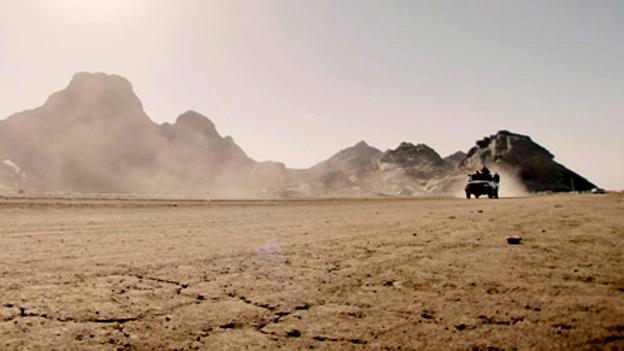Inside the secretive state of Eritrea
- Published
The BBC's Yalda Hakim: "Our minders are with us at all times"
Eritrea is considered one of the most repressive and secretive states on earth. The UN says forced labour and detention without trial are common.
There have been no elections in the country since independence in 1993 and President Isaias Afewerki has been in power for almost 22 years.
Political opponents and journalists have been imprisoned for voicing dissent.
BBC News hasn't been allowed to film in the country for around a decade. But now, my team and I have been allowed in to look at improvements in Eritrea's healthcare.
It may be one of the poorest countries on earth but the nation of roughly six million people is on track to meet three of its Millennium Development Goals, external - targets set by the United Nations in 2000 to tackle poverty.
Healthcare turnaround
Under-five mortality has dropped by two-thirds, deaths in childbirth have decreased to a quarter of what they were 30 years ago and levels of HIV/Aids and malaria have plummeted.
Getting into Eritrea wasn't easy. It took months of negotiation with the central government. After a 10-hour flight, via Turkey and Saudi Arabia, we arrived in the capital, Asmara at 04:00 bleary-eyed.
A government official was there to meet us and cheerfully told us to be ready in four hours because they had prepared a busy schedule for us.
It is difficult to ignore the beauty of Eritrea's capital city, with its leafy boulevards and Modernist buildings, a reminder of its Italian colonial past. But beneath the elegance, lies something more sinister.
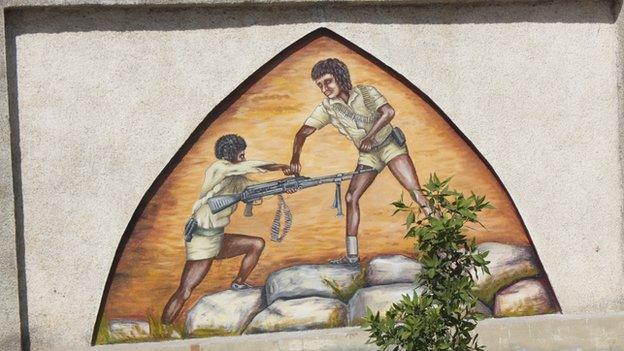
There are many murals around Eritrea reminding people of the country's struggle for independence
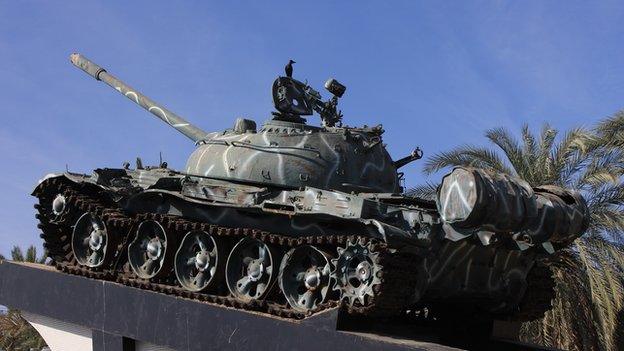
And there is a strong sense in the country that the struggle needs to continue
Eritrea is still recovering from 30 years of war with its far larger southern neighbour, Ethiopia. The fighting ended in 1991 and it became an independent nation two years later.
But that peace didn't last and, after another war, the two countries are in a state of "no war, no peace". There is a strong sense that the struggle needs to continue and all Eritreans need to do what it takes not only to protect their country but also to rebuild it.
Accompanying us on our journey was a government minder. He was with us everywhere we went, listening and taking notes during all our interviews. About a half-hour drive outside the capital is the Embaderho health clinic.
Social workers from here go into villages and people's homes to train and advise pregnant women and new mothers on what's best for them and their babies' health.
Our minder watched over us as one health worker told me: "Mothers were dying from unsafe delivery helped by local neighbours but now mothers are giving birth in hospitals.
"Because of the raised awareness, children have started to receive vaccinations on time and that is saving them from dying of chickenpox and other diseases. Really, we have seen a big change."
'Value for money'
They told me that this investment, at grassroots level, is one of the reasons they are succeeding in reducing maternal and infant mortality.
We were taken to clinic after clinic to hear about the success stories and were shown the best of the country's healthcare.

Healthcare improvements:
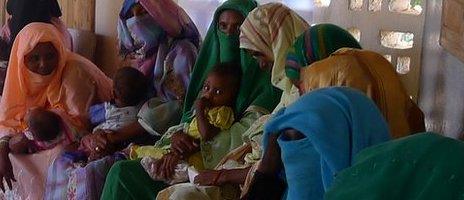
Maternal mortality rate (per 100,000)
Eritrea: 670 in 2000; 380 in 2013
Ethiopia: 990 in 2000; 420 in 2013
Under-five mortality rate (per 1,000 live births)
Eritrea: 89 in 2000; 50 in 2013
Ethiopia: 146 in 2000; 64 in 2013
Source: WHO

Yemane Ghebreab, friend and political adviser to the president, says it is all about priorities, telling me that "as a small country with limited resources, we can only thrive and compete if we can build our human resources".
Though the UN has criticised Eritrea's human rights record, it has commended its health achievements.
Christine Umutoni, the Eritrean representative for the UN Development Programme, says the lack of corruption around healthcare has helped the country reach its development targets.
"We've seen value for money and accountability. You know, you invest a little and you get a lot," she says.
We were taken to hospitals where we were introduced to women needing surgery who, we were told, were allowed to stay for as long as they needed - weeks or even months - at no cost.
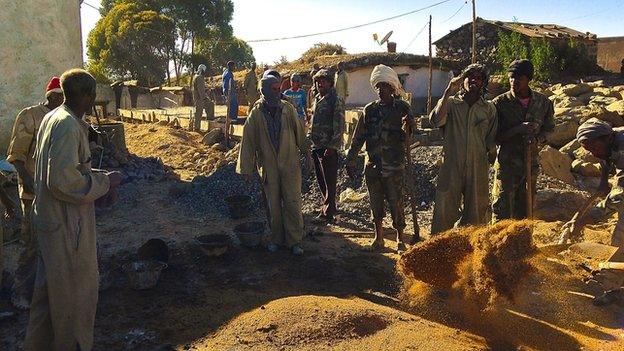
Men and unmarried women are conscripted for national service for indefinite periods, often into their 40s
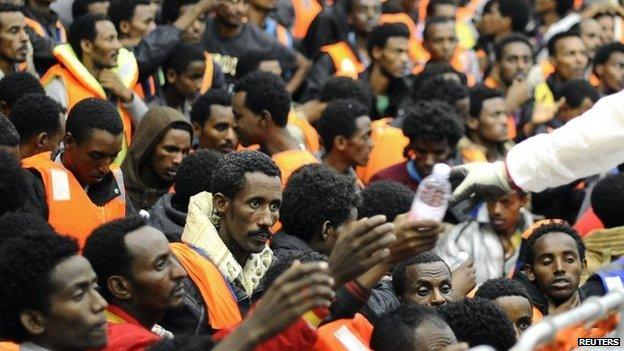
Many of the migrants picked up in the Mediterranean Sea are from Eritrea
But the question always on our minds was: If things are so good, why does the UN estimate up to 4,000 people leave Eritrea every month?
Eritreans are the second-largest nationality seeking asylum in Europe after Syrians, many risking their lives to cross the Mediterranean Sea in rickety boats supplied by people-traffickers.
Locked in shipping container
In the UK, I met one man who had fled.
He did not want to be identified, fearing for the safety of his family who still live in Eritrea.
In 2001, the Eritrean government shut down all independent media houses giving them complete control of local news organisations, as Yalda Hakim reports
He says he escaped after being imprisoned for two years without charge or trial. First he was held underground in total darkness, then kept in a shipping container with a dozen other men.
He told me that he was imprisoned for appearing to question indefinite national service. When he began to do national service at 18, he thought it would be for 18 months, instead it lasted 10 years.
National service is compulsory for those aged 18. The UN has described indefinite conscription for little or no pay as forced labour. They say it is one of the main reasons many flee the country.
Mr Yemane, who is also the head of political affairs at the country's ruling - and only - political party, didn't deny that some people are made to work, without pay, for an extended period.
However, he said it was because of the on-going dispute with Ethiopia.
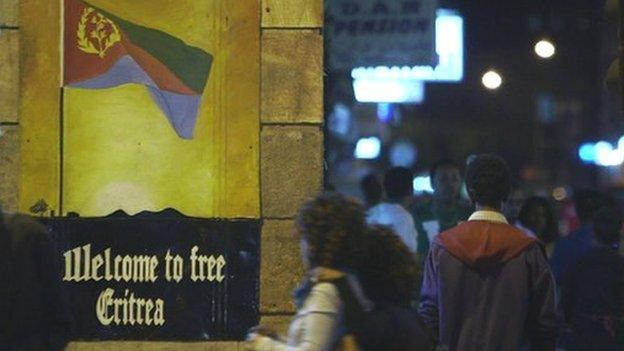
Asmara, the country's capital, comes alive at night
"To defend ourselves, we have to depend on our people. That means young people have been compelled to be in national service for longer periods of time and it's difficult for them."
Mr Yemane told us the government wants to end indefinite service, but he seemed less sure about giving his people democracy.
When asked when the country might have elections, he replied: "When the time comes we will do it, but this fixation on elections is wrong and I think it's creating problems for Africa."
It seems clear the government isn't about to loosen its grip. It is state control which has forced through improvements in healthcare.
But every night, as the centre of Asmara came alive with young and old spending time in the many bars and cafes, I was aware that at that moment dozens, maybe hundreds, of others were risking their lives to leave the country.
The full documentary Inside Eritrea will be broadcast on the BBC World News "Our World" programme on Friday 13 March at 20:30 GMT, Saturday 11:30 GMT Sunday 17:30 GMT and 22:30 GMT.
And in the UK on the BBC News Channel at 21:30 GMT on Saturday and Sunday and on the BBC iPlayer.
- Published18 April 2023
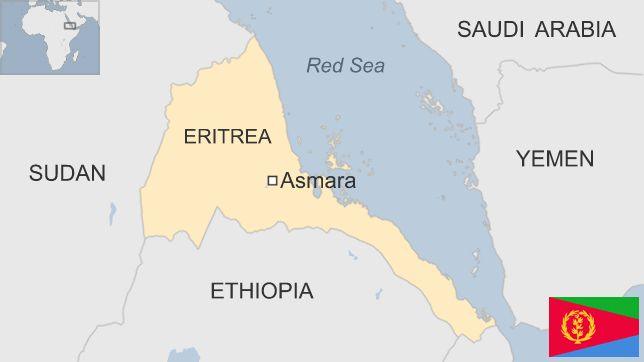
- Published23 February 2015
